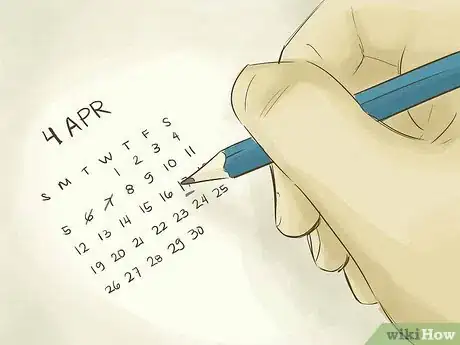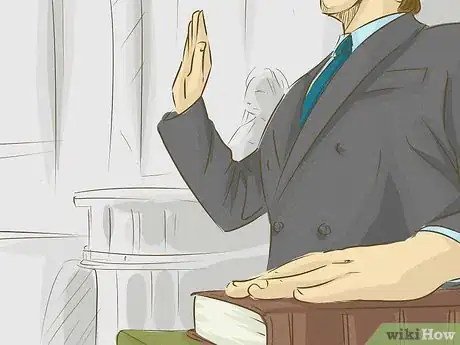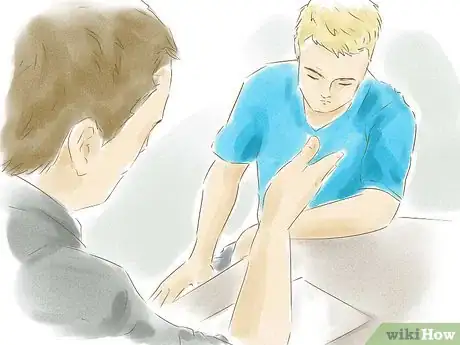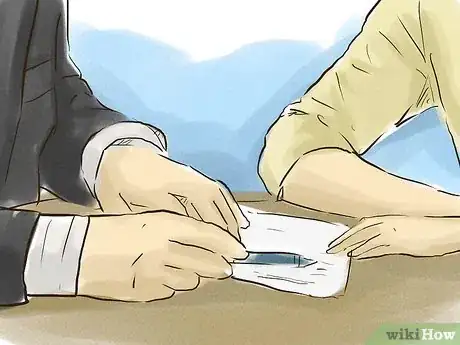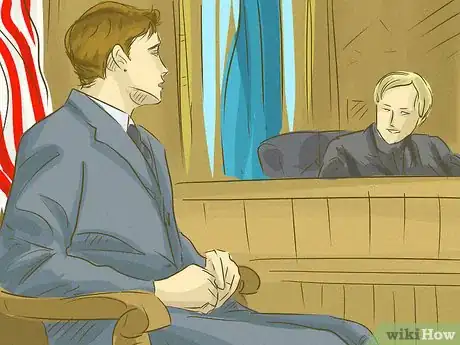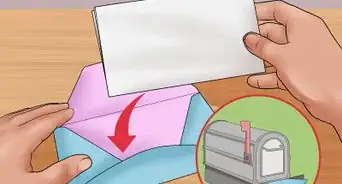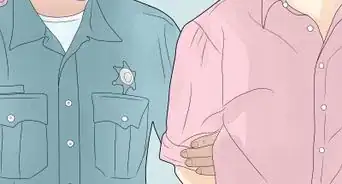This article was written by Jennifer Mueller, JD. Jennifer Mueller is an in-house legal expert at wikiHow. Jennifer reviews, fact-checks, and evaluates wikiHow's legal content to ensure thoroughness and accuracy. She received her JD from Indiana University Maurer School of Law in 2006.
There are 8 references cited in this article, which can be found at the bottom of the page.
This article has been viewed 26,443 times.
The majority of criminal cases don't go to trial. Rather, the defendant pleads guilty, typically after he or she reaches an agreement with the prosecuting attorney as a result of plea bargaining.[1] Pleading guilty may result in a lesser sentence or conviction of a less serious crime than you would have faced if you'd gone to trial. Additionally, when you plead guilty you can be certain of the outcome, rather than remain in limbo for months or even years during the slow and stressful trial process. Although specifics differ among jurisdictions, all courts follow the same basic procedure for pleading guilty.
Steps
Appearing at Your Arraignment
-
1Find out when you must appear in court. Your arraignment, or first appearance, typically will be scheduled within 72 hours of your arrest.[2]
-
2Show up in person for your arraignment. Although some courts may allow you to waive your right to be present at arraignment, you generally are required to appear in court.
- The judge may ask questions to make sure you understand the charges against you and the jail sentence or fines that may be imposed.
- You may still be in jail when your arraignment is called, or you may have had a previous bail hearing. Either way, bail will be one of the issues at your arraignment – the judge may set bail if you're still in jail, or he may lower the previous bail based on factors not presented at your bail hearing.[5]
- If you don't already have an attorney, you might want to consider asking the judge to postpone your arraignment until you've retained counsel.[6]
- Enter your plea. At arraignment, entering a plea of not guilty gives you time to consult with an attorney and work out a deal with the prosecution.
- If you refuse to enter a plea, the court will automatically enter a plea of not guilty on your behalf.
- Even though you may already know you want to plead guilty, doing so at arraignment does you no favors. You lose the ability to bargain with the prosecution for a more lenient sentence, and you can't withdraw a guilty plea later if you change your mind and decide you want to go to trial.[7]
- Additionally, if you enter your guilty plea at arraignment, you have no guarantee that you'll receive any particular sentence.[8] If you're hoping to get off with little to no jail time, that may not be possible if you plead guilty at arraignment.
- Keep in mind that you can always change your not-guilty plea at any time while your case is still pending before the court.[9]
Advertisement -
3Arrange for an attorney. You have the right to an attorney in criminal trials, and should take advantage of that right – especially if you plan on pleading guilty.
- Although you can represent yourself at arraignment, you do have the right to an attorney if you've been charged with a crime that could lead to prison time.
- Keep in mind that if you can't afford an attorney, you may qualify to have a public defender appointed for you at no charge.
- If you're planning on pleading guilty anyway, you also may be able to find a relatively inexpensive lawyer who's willing to work on the plea bargaining process with you. Many attorneys have sliding fee scales, and most will charge a lower rate if they know the case isn't going to go to trial.
Participating in Plea Bargaining
-
1Assess the strengths and weaknesses of your case. Before you meet with the prosecutor, you should go over the case with your attorney and figure out where you have bargaining power and room to negotiate.
- Your attorney will discuss the charges against you and review the police report and any other evidence available concerning your case.
- Provide as many details to your attorney as possible when discussing the events that led up to your arrest. Remember your discussions with your attorney are privileged. Your attorney has knowledge of the law that you don't, and details you may think are unimportant, insignificant, or even damaging could actually be the key to an important defense that strengthens your case.
-
2Meet with the prosecutor. Plea bargaining may involve a trip to the prosecutor's office, or you may be able to arrange a deal over the telephone.
- The prosecutor may bargain with you regarding the charge, the sentence for that charge, or the facts of the case. The most common of these is charge bargaining, through which you agree to plead guilty to a less serious charge than the one with which you're presently charged.[10] [11] For example, you may be charged with breaking and entering, but with charge bargaining you would agree to plead guilty to criminal trespass.
-
3Tell the prosecutor your side of the story. The prosecutor may be more open to cutting a deal with you if he or she understands your situation.
- If you have any strong defenses to your actions, you may want to present those to the prosecutor as well. A strong defense could decrease the likelihood that the prosecution will win a conviction if the case goes to trial, which would make him or her more likely to strike a better deal.
- If you have knowledge or information that could assist in the prosecution of other people for more serious crimes, you can use that information to plea bargain as well. For example, if you were arrested for possession of a narcotic, and are willing to supply the prosecutor with the identity and location of your dealer, you may be able to get a reduced sentence in exchange for that information.
-
4Listen to the prosecutor's offer. After discussing the crime, the prosecutor may make an initial offer in exchange for your guilty plea.
- By agreeing to plead guilty, you're guaranteeing the prosecutor a conviction in your case.[12] The prosecutor faces at least some risk that if your case is tried before a jury, you will win. Accordingly, the leniency of the prosecutor's offer will depend to some degree on how he or she has evaluated the strength of your defense.
- Because of this evaluation, having an experienced defense attorney can help you get a better deal from the prosecutor. If your attorney has a strong reputation and has won a lot of cases, the prosecutor may be more inclined to strike a deal than have to battle him or her in court.
-
5Negotiate a deal with the prosecutor. If you're not comfortable with the initial offer, explain your problems with it and offer an alternative you're willing to accept.
- Keep in mind that since you don't necessarily have the legal right to plea bargain, the prosecutor doesn't have to work with you. Whether you are by yourself or represented by an attorney, be respectful of the prosecutor and keep your tone civil and polite. Don't interrupt the prosecutor when he or she is speaking, or get angry or hostile about your case or your position.
Entering Your Plea
-
1Follow the terms of your plea bargain. A plea bargain is a contract between you and the prosecutor. If you fail to live up to your side of the bargain, the prosecutor may revoke the offer.[13]
- If you were required to do something, or provide information or documents to the prosecution, generally you must do these things before you enter your plea in court.
- Also keep in mind that if you break your agreement and the prosecution decides to take the case to trial, he or she may use any statements or evidence gained during plea negotiations at your trial.[14] For example, if during plea bargaining you said "I know I did it, but my wife just gave birth and I don't want to miss the first years of my daughter's life," the first part of that statement can be used as a confession if the prosecutor decides to try the case as a result of a broken plea agreement.
-
2Make any necessary preparations. If your deal involves any amount of jail time, the advantage of pleading guilty is that you know roughly how long you're going to be gone and can make sure you handle any personal or financial matters before you go.
- For example, if you need to make arrangements to take a leave of absence from work, you have time to do that before you appear before the judge and plead guilty. Similarly, if you are a single parent, you have time to make arrangements for a friend or family member to take care of your kids while you're in jail.
-
3Appear before the judge. You must return to court to change your plea to guilty.
-
4Tell the judge you plead guilty. The judge typically will address you by name and ask how you plead in your case.
- You should address the judge as "your honor," although "sir" or "ma'am" also may be appropriate. Speak only when the judge says your name or asks you a question, and don't interrupt or attempt to argue with either the judge or the prosecutor.
- For example, the judge might say "In the matter of State v. Jones, Mr. Jones, how do you plead?" You would respond "Guilty, your honor."
- After you enter your plea, the judge may talk to you about the charges to make sure you understand what they mean and get you to admit you committed the crime in open court.[17]
-
5Listen as the prosecution explains the deal to the judge. The judge will ask the prosecutor about your agreement, which the prosecutor will present to the judge for approval.
- Keep in mind that the prosecutor can't force the judge to approve the deal – no matter how hard you've worked on it or what is at stake. The judge will evaluate the deal in light of the charges, the information in your charging document, and other information related to your case to determine whether the deal is reasonable and fair.[18]
- In most cases judges will accept plea bargains, unless there is a significant difference between your original charge and the one to which you've agreed to plead guilty. Judges also may offer alternative or additional jail time, particularly if the agreed-upon sentence departs from your state's sentencing guidelines.
- The judge typically will review the fairness of a plea bargain in light of the seriousness of the charges against you and your prior criminal record.[19] If you don't have any significant convictions on your record, the judge will be more likely to accept a more lenient deal.
-
6Answer the judge's questions. The judge must make sure that you are knowingly and intelligently pleading guilty, and that you're aware of all the rights you're waiving by pleading guilty.[20]
- The judge will ask questions to make sure that you understand the deal you were offered, and that you accepted it voluntarily and not because you were coerced or unduly threatened.[21]
- Typically the judge also will advise you of the maximum and minimum sentences or fines you could face if you went to trial. The judge must make sure that you understand you're giving up your right to a trial by jury and agreeing to plead guilty.[22]
- State court rules may have additional statements the judge must give, or questions the judge must ask you, before he or she accepts your guilty plea.[23]
- If the judge accepts the plea bargain, you may be sentenced right then, or the judge may schedule a separate sentencing hearing. The more serious the charge, the more likely a separate hearing will be.[24]
- If the judge decides to reject your plea bargain, your case will proceed to trial.
References
- ↑ https://www.lawyers.com/legal-info/criminal/criminal-law-basics/plea-bargains-and-guilty-pleas.html
- ↑ http://www.nolo.com/legal-encyclopedia/arraignment-getting-court.html
- ↑ http://www.nolo.com/legal-encyclopedia/arraignment-getting-court.html
- ↑ http://www.criminaldefenselawyer.com/resources/criminal-defense/criminal-defense-case/criminal-arraignment-what-expect
- ↑ http://www.nolo.com/legal-encyclopedia/representing-yourself-arraignment.html
- ↑ http://www.nolo.com/legal-encyclopedia/representing-yourself-arraignment.html
- ↑ http://www.nolo.com/legal-encyclopedia/how-should-i-plead-arraignment.html
- ↑ http://www.nolo.com/legal-encyclopedia/how-should-i-plead-arraignment.html
- ↑ http://www.nolo.com/legal-encyclopedia/how-should-i-plead-arraignment.html
- ↑ http://criminal.findlaw.com/criminal-procedure/plea-bargains-in-depth.html
- ↑ http://criminal.findlaw.com/criminal-procedure/plea-bargaining-areas-of-negotiation.html
- ↑ https://www.lawyers.com/legal-info/criminal/criminal-law-basics/plea-bargains-and-guilty-pleas.html
- ↑ http://criminal.findlaw.com/criminal-procedure/plea-bargains-in-depth.html
- ↑ https://www.lawyers.com/legal-info/criminal/criminal-law-basics/plea-bargains-and-guilty-pleas.html
- ↑ http://www.nolo.com/legal-encyclopedia/pleading-guilty-what-happens-court.html
- ↑ https://www.lawyers.com/legal-info/criminal/criminal-law-basics/plea-bargains-and-guilty-pleas.html
- ↑ http://www.nolo.com/legal-encyclopedia/pleading-guilty-what-happens-court.html
- ↑ http://criminal.findlaw.com/criminal-procedure/plea-bargaining-areas-of-negotiation.html
- ↑ http://www.nolo.com/legal-encyclopedia/pleading-guilty-what-happens-court.html
- ↑ http://www.nolo.com/legal-encyclopedia/pleading-guilty-what-happens-court.html
- ↑ https://www.lawyers.com/legal-info/criminal/criminal-law-basics/plea-bargains-and-guilty-pleas.html
- ↑ https://www.lawyers.com/legal-info/criminal/criminal-law-basics/plea-bargains-and-guilty-pleas.html
- ↑ https://www.lawyers.com/legal-info/criminal/criminal-law-basics/plea-bargains-and-guilty-pleas.html
- ↑ http://www.nolo.com/legal-encyclopedia/pleading-guilty-what-happens-court.html
